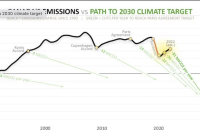Support strong Canadian climate journalism for 2025
This story was originally published by The Guardian and appears here as part of the Climate Desk collaboration.
People are used to seeing stark warnings on tobacco products alerting them about the potentially deadly risks to health. Now a study suggests similar labelling on food could help them make wiser choices about not just their health, but the health of the planet.
The research, by academics at Durham University, found that warning labels including a graphic image — similar to those warning of impotence, heart disease or lung cancer on cigarette packets — could reduce selections of meals containing meat by seven to 10per cent.
It is a change that could have a material impact on the future of the planet. According to a recent YouGov poll, 72 per cent of the U.K. population classify themselves as meat-eaters. But the Climate Change Committee (CCC), which advises the government on its net-zero goals, has said the U.K. needs to slash its meat consumption by 20 per cent by 2030 and 50 per cent by 2050 in order to meet them.
Jack Hughes, a PhD candidate who led the Durham study, said: “When you combine that [CCC advice] with the fact that high meat intake is linked to lots of health issues, and the way that we currently farm, or certainly some of the most common ways of farming, are also very heavily linked to the potential of pandemic outbreaks, it becomes clear that there are multiple reasons why the current way that we eat meat is maybe not the best way to do it.”
Hughes and colleagues split 1,001 meat-eating adults into four groups and showed each group pictures of hot meat, fish, vegetarian and vegan canteen-style meals — ranging from burgers to quiche — with either a health warning label, a climate warning label, a pandemic warning label, or no label at all.
Pandemic warnings proved the most effective at dissuading participants from eating the meat options, reducing choices of them by 10 per cent, followed by health warnings at 8.8 per cent, then climate warnings at 7.4 per cent — but researchers said the differences were not statistically significant, and that participants had judged the climate warnings to be the most credible.
Researchers believe their findings could help encourage changes in gastronomic choices that could ultimately benefit the environment. “Reaching net zero is a priority for the nation and the planet,” Hughes said. “As warning labels have already been shown to reduce smoking as well as drinking of sugary drinks and alcohol, using a warning label on meat-containing products could help us achieve this if introduced as national policy.”
The study is published in the journal Appetite.





Comments
I've been waiting many years for the article that explains what effect the disappearance of 65 million buffalo in the late 19th century had on the climate. And how the current megatonnage of ungulates on the prairie differs in effect from the natural herds of yore.
Not one article about climate and beef has ever mentioned the topic.
The following piece is fairly technical and in general there seems to be quite a bit of uncertainty on the subject.
Exploring the influence of ancient and historic megaherbivore extirpations on the global methane budget
https://www.ncbi.nlm.nih.gov/pmc/articles/PMC4743800/
What we do know is that in the current context methane emissions from livestock are a prime source of anthropogenic global heating. Methane is a much more potent greenhouse gas than carbon dioxide but its “residence time” in the atmosphere is much shorter. The good news is that dramatically reducing methane emissions can make a significant difference in a relatively short time. That is why dramatically reducing methane emissions from livestock is essential if we are to meet climate targets.
I have always wondered if green house gasses saved by eliminating ungulates wwould simply emerge else where. Decaying grass also emits a green house gas, I believe.